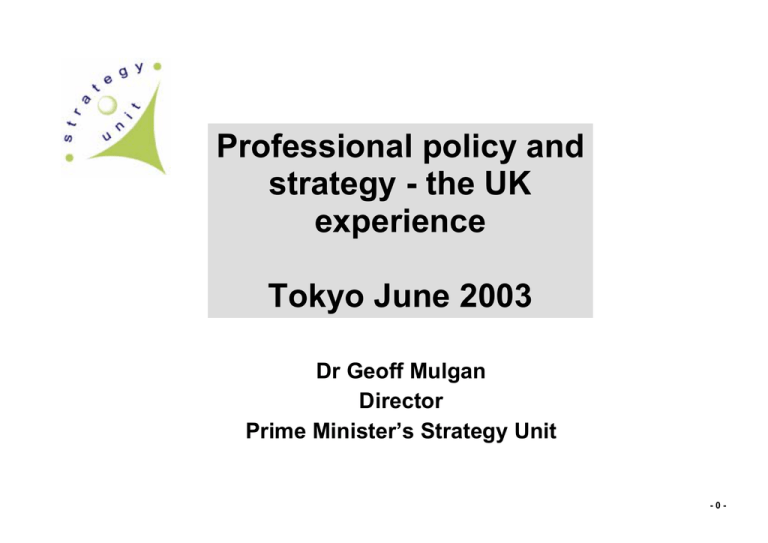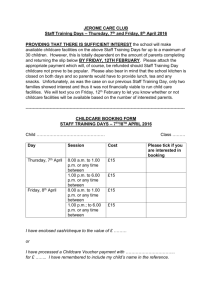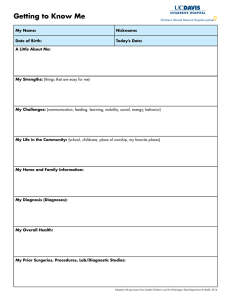Professional policy and strategy - the UK experience Tokyo June 2003
advertisement

Professional policy and strategy - the UK experience Tokyo June 2003 Dr Geoff Mulgan Director Prime Minister’s Strategy Unit -0- ‘There is nothing a government hates more than to be well-informed; for it makes the process of arriving at decisions much more complicated and difficult’ John Maynard Keynes -1- What I’ll cover • the context for government reform and the priorities for government in the 2000s • the skills and qualities required of public officials -2- The background 25 years of argument about the future of government since the economic slowdown, tax revolts of the 70s, new public management &c • strong pressures to slim government down • privatisation and marketisation • passing functions to agencies • contracting out • reducing spending • new tools of performance management • making government more business-like, with related skills • continuing rise in importance of purchasing, contract design, market design &c -3- …. the backlash In the 1980s and 1990s the pendulum swung back: • some reforms were unpopular • failure to cope with cross-cutting issues • ill-suited to integrative potential of Internet era • ill-suited to fields in which knowledge is paramount • confusions over importance of ethos and trust • limits of markets in many fields - from nurseries to schools -4- The synthesis …. • renewed emphasis on positive role government play in solving problems • in the UK substantial new investment (annual real growth in spending of over 5%) • much tougher emphasis on reform to drive performance improvements, and concern for what works • sharper focus on the twin challenges of better strategy and better delivery -5- The overall picture - creating public value Assessments of future challenges and opportunities Public needs, aspirations/ opinions Politics/values/ideas High level goals: outcomes, services, security, trust Public Culture feedback consultation s engagement Strategic Direction Knowledge IT Policy Design Delivery Structures People Testing, piloting, Resources continuous learning Skills analysis KNOWLEDGE DEMOCRACY Systems experience Public value created -6- Public value priorities Trust Evidence, analysis Outcomes Services Public engagement Security -7- 1. Restore trust Problem: loss of trust and confidence in governments • clarity: pledges, targets etc • integrity and ethos: stronger ethics, codes of conduct, antisleaze measures • honesty and arms length bodies: independent regulators such as Food Standards Agency and Financial Services Authority • contrition: rapid response to crises - knowing when to say sorry and leaders taking personal responsibility -8- Turning around secular trends towards less trust ... 100 90 80 70 60 50 40 30 20 10 0 % having “a great deal”/”quite a lot” of confidence in... 88 74 72 58 54 52 46 40 25 30 church 37 26 14 armed forces 46 44 22 17 civil service 10 NHS 1983 1996 2000 legal system 14 Parliament Banks Source: The Henley Centre -9- Complex shifts in relative influence of big institutions and personal networks % saying they are influenced on social and environmental issues by... Family Friends Government 2001 TV 1996 Newspapers Political parties Work colleagues The church Business leaders Advertising Royal family 0% 5% 10% 15% 20% 25% 30% 35% 40% Source: Future Foundation, NVision - 10 - New skills needs • ability to engage with stakeholders in much more open processes • seeing communication as integral to policy • operating in more complex architecture of local, regional, European and global governance • new toolkit of means of involving the public consultations, juries, referendums - 11 - 2. Outcomes shaping budgets & structures Problem: a system that’s better at process than outcomes • defining outcome goals more clearly (eg literacy, crime reduction) and tying to budgets via Public Service Agreements which define policy priorities • national standards - eg for cancer, cardiovascular and mental health services • league tables and action on poor performers • Delivery Unit in the Cabinet Office to oversee performance management • pragmatism about means and boundaries (outsourcing, Best Value, strategic alliances, contestability) - 12 - - 13 - Joined up policy and delivery as key to better outcomes, combatting departmental silos • budgets: for areas (Neighbourhood Renewal and New Deal for Communities), client groups (Surestart and Children’s fund), problems (criminal justice and drugs) • new departmental structures - Department for Work and Pensions, Department for Environment, Farming and Rural Affairs AND shared PSAs • joined up policy making: the Social Exclusion Unit, Strategty Unit etc • data management and sharing • joined up delivery through partnerships (including Local Strategic Partnerships) • cross-cutting roles for ministers • heavy use of evidence base on ‘joined up problems’ - 14 - - 15 - Connexions service - 16 - The focus on outcomes requires new skills and approaches - analytic, delivery, strategic, ability to work in partnership - 17 - Methods, skills and experience This requires... Good strategy work... Is based on evidence and sound analysis Appreciation of key analytical approaches, including basic economics, statistics, business modelling etc Is holistic Multi-disciplinary teams Is sophisticated about complexity Understanding of complex systems and their dynamics Is creative and innovative Range of experience and processes for creativity Is grounded in an understanding of how the world works A wide experience base Is robust over long time periods Futures methods Is communicated compellingly Storytelling and logical storyboarding skills Is sophisticated about managing risk Robust risk management approaches Takes into account organisational capacity and rates of behavioural change Understanding of organisational capacity issues Takes into account deliverability Delivery skills Includes all key decision makers, including ministers Careful management of process and stakeholders - 18 - Analytic methods include: • trends analysis • benchmarking • logic trees • market analysis • evidence reviews • modelling • forecasting • simulations • scenarios - 19 - Issue trees help to map out where evidence is needed e.g. SU Childcare Review Is existing provision best for children? Is existing childcare provision and policy failing, will it fail in the future and, if so, should and how can the government intervene to improve it? Is existing childcare provision and policy failing and, without changes, will future provision fail? Is existing provision failing parents? How can the government best improve childcare provision? Is existing provision accessible for parents? Is childcare affordable? What childcare provision is needed to allow parents to return to work? Does and will demand outstrip supply? What are existing government policies doing to help? What is the rationale for government intervention in childcare? Does existing provision allow parents choice? Will childcare intervention help meet government objectives? Are there market failures in childcare? How can the government intervene to best effect? How is government intervention best delivered? Will childcare intervention improve distributional outcomes? Will childcare intervention help meet more general govt objectives? What intervention should there be on the demand side? What intervention should there be on the supply side? What are the government’s aims and principles? Will childcare intervention help meet employment aims? Will childcare intervention help meet educational aims? What are the options for financial assistance? What effect will such assistance have (will it increase supply)? What is the potential role of employers, and private/ voluntary sector providers? What support will government need to provide in terms of finance or infrastructure, e.g. schools? - 20 - Literature reviews summarise findings – SU Childcare Review 2002 Y ? reduced teen pregnancy - child M reduced child abuse improved health - child reduced welfare recipience - mother reduced crime rates - mother reduced welfare recipience - child Y improved employment - mother Y Y improved employment - child ? Y External benefits reduced crime rates - child improved mental health increased educational attainment increased maternal employment improved parenting indicators Y ? ? Y improved emotional/psych. Y M Y Y M Y Y Int - Parent improved qualifications at age 18 21 Y 8 Y n/a n/a Y 7 ? Y Y reduced special educational needs Y Y M M Y Y ? Y Y Y increased family income US US UK UK US US increased school attainment to 18 20 Y 27 Y 14 5 Y increased school attainment to 11 Y Y Y Y improved behaviour US US US US increased IQto age 11 Age of child at last follow up Perry pre-school Chicago CPC Project Care Syracuse Univ. Family Carolina Abecedarian IHDP - full sample EEC 2000 EEC 2001 Head Start - Westinghouse Report Head Start - Currie&Thomas Childcare Cost, Quality and Child Outcomes Effects of Public Daycare NICHD data - Belsky NICHD - cognitive and language NICHD - quality NICHD - behaviour NICHD - attachment Vandell & Henderson EPPE EPPNI Targeted at low SES children Name of project/scheme Early Childhood Interventions. Early Training Project (reported) Country Internal - Child ? ? Y US N SweN US dN US N US N US N US N US N UK N NI N 8 13 Y Y Y Y Y ? ? Y Y Y Y Y Y Y Y Y Y Y Y Y Y Y Y Y Y Y Y Y N 3 Y 6 3 1.5 8 7 Y 6 Y Y Y Y Y - 21 - Modelling tests out impacts of possible policies – SU Childcare Review NET PLACES EXPECTED At March 31 New build Sure Start glue Children’s Centres Nursery glue Total Govt supported Nursery new build Unsupported Nursery conversion Childminder 0-4 Total Childminder 5-14 Out of School Clubs Total Total 2001 2002 2003 At March 31 New build Sure Start glue Children’s Centres Nursery glue Total 0-4 year places Govt supported Nursery new build Unsupported Nursery conversion Childminder 0-4 Total Childminder 5-14 5-14 year places Out of School Clubs Total Total additional children helped 2001 2002 2003 0-4 year places 5-14 year places CHILDREN HELPED 2004 2005 1,496 0 3,290 4,786 13,137 25,439 11,218 5,060 59,640 1,117 21,221 21,220 21,221 22,337 21,221 81,977 0-4 ratio places:children 5-14 ratio places:children 2004 2005 1,944 0 4,278 6,222 17,078 33,071 14,583 6,578 77,532 1,954 37,136 37,135 37,136 39,089 37,136 116,622 2006 3,490 0 7,678 11,168 13,137 27,401 11,218 5,060 67,983 1,117 21,220 22,337 90,320 1.30 1.75 2006 4,537 0 9,981 14,518 17,078 35,621 14,583 6,578 88,379 1,954 37,135 39,089 127,468 - 22 - International benchmarking identifies promising practice - SU/DCMS Sports review 2002 - 23 - 3. Services: focused on customer needs Problem: traditions of producer control, poor understanding of public and their needs • greater choice • service guarantees • some shift to 24/7, late opening etc • contestability • measurement of customer satisfaction and experience • transparent information - 24 - Personalisation, both high tech and high touch • UK Online, 100% service access online by 2005, services clustered by user need • sharp growth in call centres (eg NHS Direct) • Personal advisers in New Deal, Connexions • Mentors and volunteers • Combinations of face to face, phone and web - eg Walk-in Centres plus 24 hour telephone advice plus online diagnosis through NHS Direct - 25 - - 26 - A far more data-rich environment - 27 - More attention to customer satisfaction, and drivers such as communication … % Net Well Informed 80 British Telecom 60 Electricity Company Local Secondary British Gas Schools Post BBC Office Local Primary Schools Northern Ireland Water Company 40 20 0 National Savings Bank -20 Benefits Agency Nearest Leisure Centre Local Hospital DVLA Local Council DSS Inland Revenue Social Services Dept -40 0 Base: All 10 20 30 40 50 60 70 80 90 100 % Net Satisfaction - 28 - New forms of policy development collaboratives to engage practitioners in continuous learning - 29 - Explicit management of innovation and r&d to generate new knowledge within services • risk money – eg innovation funds • incubators to develop promising ideas • zones with flexible rules • pilots • joint ventures promoting flexibility (eg Working Links) • ‘what works’ units to scan for promising practice - 30 - The focus on services is putting a high premium on delivery skills, project and programme management, engagement with the front line - 31 - 4. Security and sustainability Problem: core roles of state as important as ever, with new forms of threat, domestic/international overlaps • global strategy for security, encompassing military action, development aid, public health, environment • working in networks, public diplomacy &c • domestic security focusing on new threats, counterterrorism, organised crime • project-based working for issues straddling domestic/international divide: drugs, migration, energy • new arrangements for managing risk within government • focus on long-term sustainability - 32 - New ‘civil contingencies secretariat’ to scan horizon for short-term disruptive threats and ensure prevention, mitigation and management - 33 - Futures teams in all departments linked in a cross-government strategy network - 34 - Scenario methods used to map impacts and likelihoods of threats and opportunities Likely Solar Cheap LNG energy Carbon Sequestration EU gains Asian Hydrogen energy Cellulosic economic Iraq leaves Fuel Cells competence Ethanol boom OPEC Sustained terrorist Breakdown in Global production from attacks on EU protectionism economic Middle East infrastructure Coal-to-oil downturn High Tar Sands Low Impact impact Transit pipeline Gas Russia IPE or blockage Longford type OPEC joins OPEC trading gas explosion forms meltdown Nuclear disaster forcing global shutdown EU falls apart Superconductors Key: Savage winters changing demand Freak waves destroying Market Change offshore infrastructure Technological change Nuclear Unlikely Disruption Fusion Tanker catastrophe - 35 - Foresight methods to map key challenges Major Drivers Patient Expectations Medical Advances Information & Support Technology Demography & Society Epidemiology 5 yrs 10 yrs 15 yrs 20 yrs (2007) (2012) (2017) (2022) Consumerism Meeting needs of older people Holistic health & wellbeing WidespreadGenetic Screening & Therapy Stem Cell Technology Major Pharmaceutical Innovation Pharmacogenomics Minimally Invasive Surgery Complete EPR & use of IT networks Home Monitoring Robotics Intelligent Devices Protocol Driven/Expert Systems Inequalities Population growth in 45 - 75 age group Population growth in in >75 age group Smaller households, single parents, living alone Chronic disease increasing Focus on managing risk factors Portfolio careers Labour Force Lifelong learning Time when we predict that a major change may be seen in this dimension Greater differentiation of diagnosis Labour force ageing and participation rates reducing Increasing informal elderly care demands A end to retirement? Source DH - 36 - The focus on long-termism and security requires skills in horizon-scanning, risk management, contingency planning, development of leadership skills - 37 - Level Exec. coaching Perm Sec 2 3 Enga -ging with Govt Key Delivery Skills Bespoke provision Top Managers Forum Corporate Governance Strategic Leadership 1/2 day modules in PPM, risk, strategy, etc Top Management Programme ELearning As se ss me nt 5 6/7 Open Opportunities Legend: Developing Top Management Aspiring to Top Management Top Management Suite Partnership Leaders Intro. to Corporate Leadership Public Services Leadership Scheme Delivery Leaders Public sector MBA Leadership Development Suite New programmes / Existing programmes Other opportunities: Specialist CS College programmes; Pathways (leadership developments for ethnic minorities); interchange / secondments - 38 - In conclusion In the UK: higher expectations of more active role for government involves more porous civil service … and different skill sets required - strategy, delivery, project and programme management, communications - 39 - Good strategy “I would not give a fig for the simplicity this side of complexity … I would, however, give my life for the simplicity on the other side of complexity.” Oliver Wendell Holmes - 40 - Competent delivery Encouraged by direct experience of making things work - with the minimum of crises - 41 - Mobilising support ‘Talk about it’ - Clement Attlee (his deputy, later Prime Minister) on what Churchill did to win the war - 42 - Encouraging not just methods but also new qualities quickness - instead of slowness lightness - instead of heaviness visibility - instead of secrecy exactitude - instead of vagueness multiplicity - instead of homogeneity consistency - instead of incoherence Italo Calvino, Memos for the Millennium - 43 -





